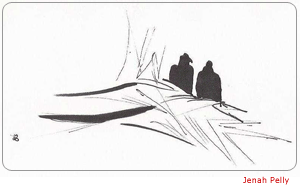“In the early 20th century natural gas companies would introduce a rotten meat odor to the gas lines. They would then patrol the pipelines. Where the vultures were circling, they knew they had located a gas leak.”
--Natural New Eng. Issue # 8
Turkey Vultures poop on their feet. These birds don’t mean to be foul. It’s just nature’s way of protecting them for the role they are designed to play. Remember that messy road kill you passed last week as you were driving to work? Did you wonder why it was gone a day or two later? A Turkey Vulture probably ate it. Avian cleaner–uppers, these birds eat carrion. Their big feet habitually stand on fresh or rotting flesh as they feed. Their excretion contains ammonia, which acts as a  purifying agent and cleanses the feet of bacteria from the rotting carcasses. purifying agent and cleanses the feet of bacteria from the rotting carcasses.
A Turkey Vulture in flight seems an unlikely candidate for such disgusting habits. When these birds rise on thermals, or warm air currents, they float effortlessly, their almost seventy- inch wings spread out and lifted in a distinctive V- shape or dihedral. Once aloft, they seldom flap. Their long, broad wings allow them to be buoyed by updrafts that provide lift and conserve the birds’ energy. Often they fly at high altitudes, rocking gently from side to side. They are paeans of grace and style, each one a mass of blackness contrasted only by the silver grey underside of the lower half of the wing. A group of them in flight, as they often appear, can be a thrilling sight.
Get close to one, however, and you might feel like taking flight yourself. The adult Turkey Vulture’s featherless head, a shriveled mass of raw looking red skin, could make you cringe. The Hitchcockian stare of its beady black eye could keep you awake at night. The hooked pale beak with deep nasal openings, testimony to the bird’s well-developed sense of smell, could turn your stomach. So could the bird’s habit of regurgitating undigested meat if it is threatened. To the Turkey Vulture you represent a predator, and the nasty smelling stuff it’s likely to hurl at you if you frighten it is simply a natural defense.
Hold your nose for a minute and consider these birds from an objective point of view. They fill a niche in nature’s plan. There’s plenty of garbage in the world, and scavengers like the Turkey Vulture help to clean up at least some of it. Like the bird in flight, there is beauty in that.

|
